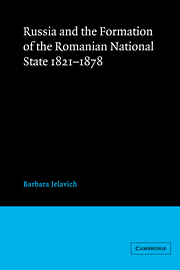Book contents
- Frontmatter
- Contents
- List of maps and illustrations
- Preface
- Introduction: The establishment of Russian influence in the Danubian Principalities
- I The Russian protectorate
- II The European guardianship
- III The Cuza era, 1859–1866
- IV Prince Charles, 1866–1871
- V Prince Charles, 1871–1878: the Eastern crisis
- Conclusion
- Notes
- Bibliography
- Index
- Plate section
V - Prince Charles, 1871–1878: the Eastern crisis
Published online by Cambridge University Press: 18 December 2009
- Frontmatter
- Contents
- List of maps and illustrations
- Preface
- Introduction: The establishment of Russian influence in the Danubian Principalities
- I The Russian protectorate
- II The European guardianship
- III The Cuza era, 1859–1866
- IV Prince Charles, 1866–1871
- V Prince Charles, 1871–1878: the Eastern crisis
- Conclusion
- Notes
- Bibliography
- Index
- Plate section
Summary
THE CATARGIU GOVERNMENT: THE FIRST PERIOD
With the successful conclusion for Russia of the London Conference and the establishment of the government of Lascăr Catargiu, a period of comparative calm that was to last until the spring of 1876 was introduced in the foreign policies of both Russia and Romania. General European diplomatic affairs remained in a similar condition. Like the other European states, both the Russian and the Romanian governments had to adjust to the new diplomatic balance that had come about with the unifications of Germany and Italy, the reorganization of the Habsburg Monarchy, and the weakening of France.
For Romania the elimination of France as a major element in Eastern diplomacy was to be of prime significance for the future. Although relations had not always been smooth, this power had contributed more to Romanian national development than any other state. Since the two countries were geographically separated, France could never pose the same threat to Romanian territory as had the neighboring Habsburg Monarchy, the Ottoman Empire, and Russia at different periods. The new Germany was not to be a substitute despite Charles's Hohenzollern family ties. Bismarck was to prove particularly difficult, as would be shown in the negotiations over the controversial Strousberg railroad concession. He was also a man to hold a grudge. In May, in a conversation with Peter P. Carp, he complained about the Romanian attitude during the Franco-Prussian War, the comments in the press, and other incidents that had occurred and concluded: “We are the friends of our friends and the enemies of our enemies.”
- Type
- Chapter
- Information
- Publisher: Cambridge University PressPrint publication year: 1984



